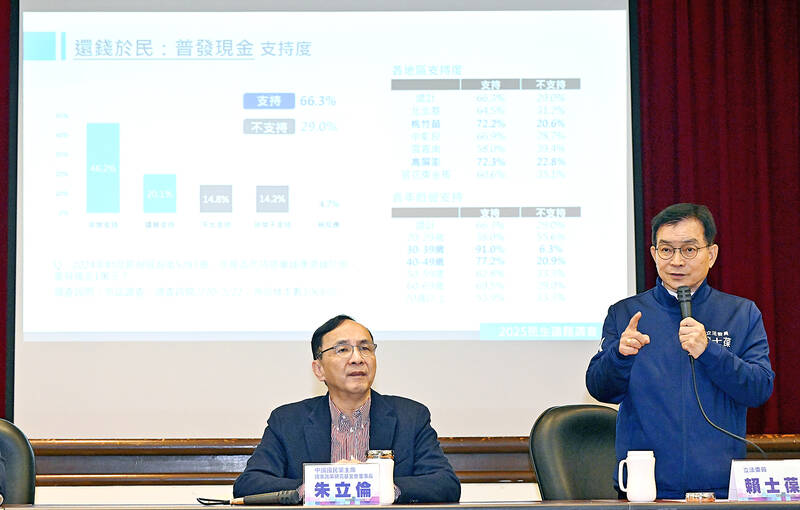The Chinese National Party (KMT) yesterday called for the government to distribute universal cash payouts of NT$10,000 (US$305) per person from surplus tax collected last year.
In fiscal year 2024, NT$3.76 trillion in taxes were collected, a record high that surpassed expected tax revenue in last year’s annual budget by NT$528.3 billion, the Ministry of Finance said last week.
KMT lawmakers have since said that the money should be returned to taxpayers, proposing cash payouts of NT$10,000 for each resident in the country.

Photo: Liao Chen-huei, Taipei Times
Even after such a distribution, which would cost NT$230 billion, more than half of the surplus would still be left for the government to use, they said.
In response, the ministry at the time said the government would prioritize reducing debt to ensure financial resilience and discipline, adding that the remaining surplus after debt reduction would be added to the annual surplus and be used as a source of financing.
At a news conference yesterday, the KMT released a poll commissioned by its think tank that showed 66.3 percent of respondents support returning surplus tax collected last year to the public as cash payments of NT$10,000 to each person.
The highest support rates were observed in Taoyuan and Kaohsiung, and Hsinchu, Miaoli, Penghu and Pingtung counties with about 72 percent support in these areas, the think tank said.
The lowest support came from Yunlin, Chiayi and Nantou counties, with 58 percent supporting the measure, it said.
People aged 30 to 39 expressed the highest support rate of 91 percent, while people aged 20 to 29 expressed a support rate of only 38 percent, the poll showed.
National Policy Foundation head Ko Chih-en (柯志恩) said the poll, conducted by All Dimensions Public Research, collected 1,068 responses from Thursday to Saturday last week, and has a margin of error of three percentage points.
The Singaporean government announced a tax return of NT$20,000 to Singaporeans aged 20 or older on Tuesday last week, KMT Chairman Eric Chu (朱立倫) told the news conference.
US Department of Government Efficiency head Elon Musk on Thursday last week said that tax money saved due to federal government layoffs would be returned to US taxpayers, with each receiving US$5,000, Chu said, adding that US President Donald Trump has endorsed the motion.
Taiwan should follow the example of Singapore and the US and return the tax surplus to the public, he said.
According to the KMT caucus, among bills it hopes to pass during the new legislative session that began yesterday is to a enact legislation to share surplus tax revenues with residents.
It said it would introduce a draft amendment to the Budget Act (預算法) to stipulate that once the net amount of the government’s collected tax revenue reaches 120 percent of the budgeted amount, the government should pay a universal tax rebate.
Additional reporting by CNA

Taiwan is stepping up plans to create self-sufficient supply chains for combat drones and increase foreign orders from the US to counter China’s numerical superiority, a defense official said on Saturday. Commenting on condition of anonymity, the official said the nation’s armed forces are in agreement with US Admiral Samuel Paparo’s assessment that Taiwan’s military must be prepared to turn the nation’s waters into a “hellscape” for the Chinese People’s Liberation Army (PLA). Paparo, the commander of the US Indo-Pacific Command, reiterated the concept during a Congressional hearing in Washington on Wednesday. He first coined the term in a security conference last

Prosecutors today declined to say who was questioned regarding alleged forgery on petitions to recall Democratic Progressive Party (DPP) legislators, after Chinese-language media earlier reported that members of the Chinese Nationalist Party (KMT) Youth League were brought in for questioning. The Ministry of Justice Investigation Bureau confirmed that two people had been questioned, but did not disclose any further information about the ongoing investigation. KMT Youth League members Lee Hsiao-liang (李孝亮) and Liu Szu-yin (劉思吟) — who are leading the effort to recall DPP caucus chief executive Rosalia Wu (吳思瑤) and Legislator Wu Pei-yi (吳沛憶) — both posted on Facebook saying: “I

The Ministry of Economic Affairs has fined Taobao NT$1.2 million (US$36,912) for advertisements that exceed its approved business scope, requiring the Chinese e-commerce platform to make corrections in the first half of this year or its license may be revoked. Lawmakers have called for stricter enforcement of Chinese e-commerce platforms and measures to prevent China from laundering its goods through Taiwan in response to US President Donald Trump’s heavy tariffs on China. The Legislative Yuan’s Finance Committee met today to discuss policies to prevent China from dumping goods in Taiwan, inviting government agencies to report. Democratic Progressive Party Legislator Kuo Kuo-wen (郭國文) said

The Ministry of Economic Affairs has fined Taobao NT$1.2 million (US$36,900) for advertisements that exceeded its approved business scope and ordered the Chinese e-commerce platform to make corrections in the first half of this year or its license would be revoked. Lawmakers have called for stricter supervision of Chinese e-commerce platforms and more stringent measures to prevent China from laundering its goods through Taiwan as US President Donald Trump’s administration cracks down on origin laundering. The legislature’s Finance Committee yesterday met to discuss policies to prevent China from dumping goods in Taiwan, inviting government agencies to report on the matter. Democratic Progressive Party